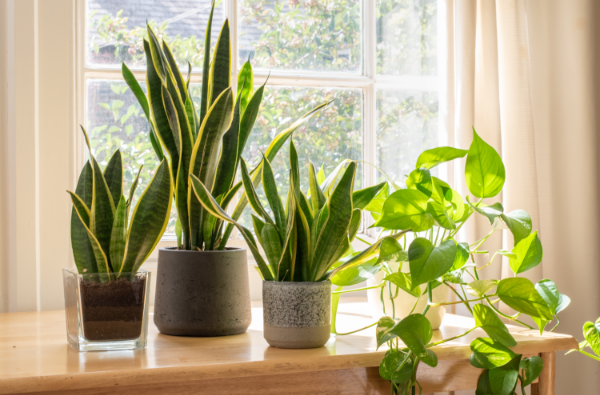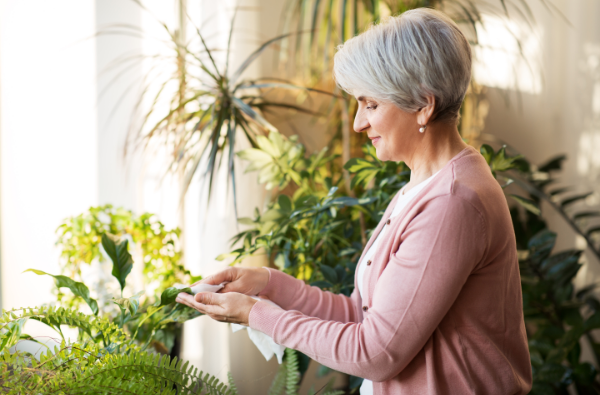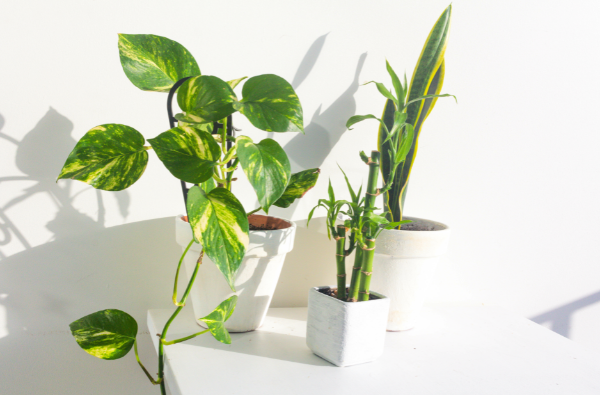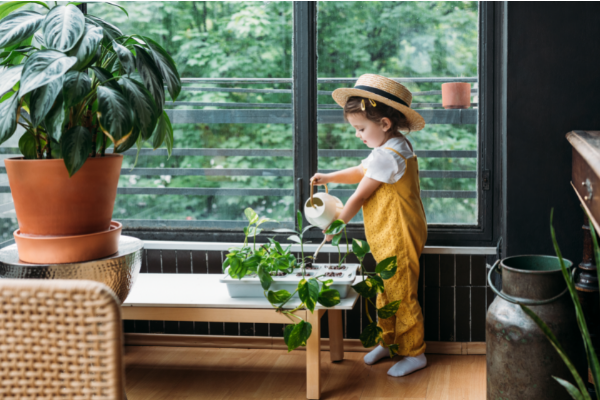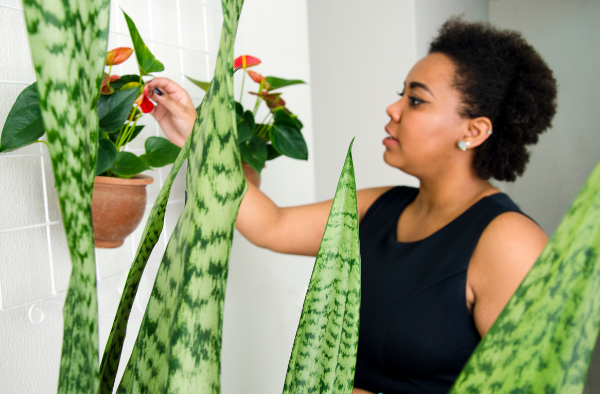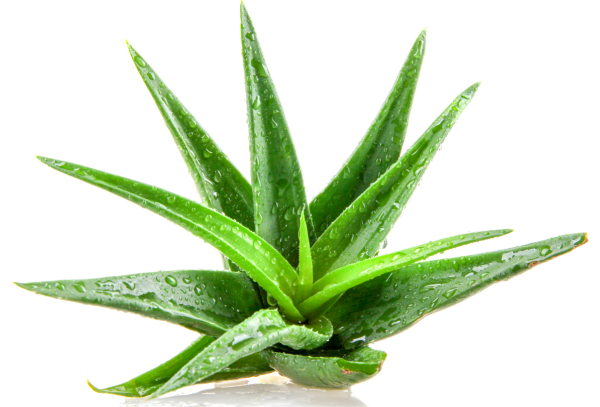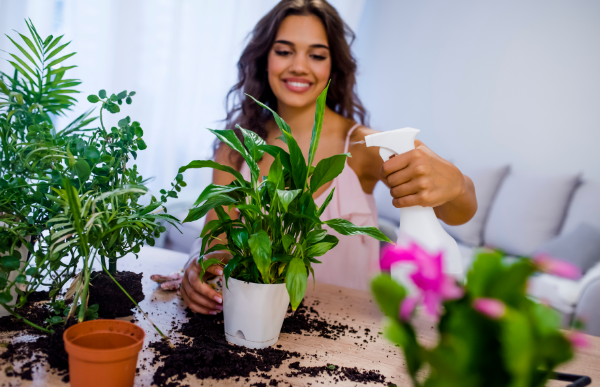HousePlantJoy is supported by our audience. When you purchase through one of our links, we may earn a small affiliate commission. As an Amazon Associate I earn from qualifying purchases. Your cost is not affected.
==================
How Can Houseplants Promote Our Wellbeing?
It may seem incredible that houseplants promote our wellbeing. Yet they do influence how we think and how we react. Our house plants keep us calm and relaxed after getting home exhausted and stressed from work. They also help us avoid common and chronic ailments. These conditions make life challenging and prevent us to do our usual daily activities. So how can houseplants help us live life to the full? How can they support us to live longer?
When life becomes difficult, we need to go back to the basics. Mother nature can help us avoid stress, fatigue, depression, dementia, or cardiovascular disease. Speaking of nature, do you know that putting plants inside the house promotes our wellbeing? Having houseplants gives us health benefits, and at the same time makes a lovely addition to our living places.
Houseplants complement modern architecture and designs. They gain popularity by adding to the interior concept ideas of a house or an office. Further, houseplants are a fad at the moment. Try browsing your social media. You can see postings and groups of houseplant varieties. The bottom line: we all love plants and flowers. Now, let us see how they affect us in a good way. And hoping after reading this article on how houseplants promote our wellbeing, you will adopt some into your home.
Six ways houseplants promote our wellbeing
When health problems arise, it is a cause of great sorrow and grief for all concerned. Further, physical, emotional, and mental illnesses put us in financial difficulties. Before they set in, we need to take action to avoid these pitfalls. Let us be proactive and take control of our lives. Indeed, we cannot accomplish all the things we want to do if we are sick. So how do houseplants promote our wellbeing?
1. Houseplants control cortisol levels
When we suffer from stress, we produce a hormone called cortisol. Chronic stress elevates cortisol levels. As a result, it causes digestion problems, abnormal sleeping habits, and a low immune system. These lead to high blood pressure, high blood sugar levels, allergies, asthma, and autoimmune disease. Those are the stark situations. But, there’s always a brighter side for plant mom or dad because our houseplants promote our wellbeing.
Having houseplants reduce our stress, anxiety, and fatigue. We immediately cheer up or lighten up whenever we see our favorite houseplants. They give delight to our souls. Our happiness goes beyond the surface. It is not superficial; it goes deeper than a smile or a laugh. And this happiness affects our whole being – mind, and body. How?
When we are happy and calm, we produce hormones like serotonin and dopamine. How do these happy hormones promote our wellbeing? Serotonin regulates our sleep, mood, and digestion. On the other hand, dopamine relates to our feelings of satisfaction when we achieve our goals. It also controls motivation, sleep, attention, coordination, and memory. So let us choose to be happy by having indoor plants in our homes and offices. They help improve our wellbeing and quality of life.
2. Houseplants lower the risk of pulmonary diseases
Houseplants have remarkable air-purifying properties. According to NASA’s study, they can remove as much as 95% of indoor air pollutants. They absorb carbon dioxide as part of their metabolic processes and give off oxygen as a by-product. Examples of houseplants that promote our wellbeing are:
- pothos
- Sansevieria
- spider plants
- peace lily
- bamboo palms
They remove other volatile organic substances (VCOs) from indoor air. They come from different materials inside our houses and offices. Some sources of VOCs include cigarette smoke, sealants, paints, varnish, acetone, nail polish, disinfectants, and furniture. High levels of VOCs inside our homes can cause damage to our lungs and central nervous system.
VCOs may irritate the eyes, nose, and throat. Prolonged exposure can cause asthma attacks, headaches, nausea, and loss of coordination. Yet, houseplants absorb these toxic substances and give off water and oxygen. As a result, they purify indoor air while protecting us from exposure to high levels of VOCs.
3. Houseplants promote our wellbeing by removing allergens from indoor air
Other impurities are present in indoor air, like molds and bacteria. They may be lurking in areas with less airflow and exposure to direct sunlight. What houseplant does an impressive job in cleaning air allergens? None other than the delightful peace lily. It comes in silver, variegated, and green foliage. How does peace lily remove molds and their spores from indoor air to help promote our wellbeing?
First, the peace lily absorbs vapor in the air to remove the dampness in the bathroom or kitchen. So it prevents the formation of mildew, a flat thin whitish growth of either mold or fungus. Second, the peace lily captures molds and their spores through its leaves. Then, it carries these microorganisms through its stalk. And it releases them into the soil through its roots. Lastly, soil bacteria consume these molds and spores as food.
But there are other houseplants aside from peace lily that have the same property, such as:
- bamboo palms
- spider plants
- snake plants (Sansevieria)
- orchids
- Boston ferns
- pothos
Similarly, these houseplants remove microbes from indoor air. They have dual actions: absorb both toxic substances and harmful microorganisms. With allergens out of the way, we are no longer in danger from symptoms like sneezing, skin or eyes itchiness, runny or stuffy nose, and red or swollen eyes.
4. Indoor plants soothe common health problems
How do houseplants promote our wellbeing by soothing common health problems? Houseplants increase humidity through evapotranspiration. This process allows the plant to take water from the soil through its roots. Then the water goes up to its stem and comes out of the leaves through transpiration. The water then evaporates, and as a result, it increases indoor air humidity.
When the air is dry, we need a humid environment to keep us cool and comfortable. What houseplants do well in increasing the moisture of indoor air? These are spider plants, Jade plants, rubber trees, Boston fern, peace lily, anthurium, and golden pothos, to name a few. How do they affect us? With the increased moisture in the air, it relieves us of the following:
- Dry skin
- Sore throat
- Allergy attacks
- Nosebleeds
- Sinuses
With houseplants, we have natural skin moisturizers and cold remedies. Only nature can offer these benefits with minimal effort on our part. Most houseplants are easy to care for and maintain. They only need less water and more indirect sunlight. So they are easy to grow indoors.
5. Aloe vera houseplant provides first aid to simple ailments, cuts, and burns
Another wonder is the aloe vera house plant, which has become a multi-billion dollar beauty industry. Aloe vera gel is a popular ingredient in shampoos, lotions, facial masks, lip balms, and other beauty products. Its antibacterial, antiviral, and antifungal properties are due to its anthraquinones content. Anthraquinone derivatives have medical applications such as laxative, antimicrobial and anti-inflammatory agents.
Here are some of the health benefits of aloe vera houseplants to promote our wellbeing:
- Soothes and heals minor burns and cuts
- Detoxifies the body
- Relieves digestive problems such as gastric ulcers and constipation
- Reduces arthritis pain and swelling
- Heals skin problems such as psoriasis and eczema
- Cures gum infections
- Soothes strains and sprains by decreasing inflammation
- Acts as an expectorant for decongested lungs
- Gives first aid to rashes and skin allergies
- Lowers the blood sugar levels
- Relieves heartburns
Aloe vera houseplant is also one of the best air purifiers. It absorbs air pollutants such as carbon, benzene, and formaldehyde. Also, it stores water in its leaves, so it thrives in humid areas like the bathroom and kitchen. It is low-maintenance and ideal for a busy plant mom. Clearly, aloe vera houseplants support our wellbeing in many ways. But be careful because aloe vera can be a health hazard too. Long-term use may cause side effects, and poisonous varieties exist.
6. Indoor plants have positive effects on the patient’s recovery
Hospital patients have a shorter recovery period when recuperating when they view green spaces. So gifting them houseplants aids in their healing process and recovery. Further, they develop a higher pain tolerance when exposed to nature What involves in this condition? One of the happy hormones is responsible – the endorphin. When we are happy, our brain: the hypothalamus, and pituitary glands produce the endorphin. How to release endorphins?
One manner to release endorphins is by making the patients smile or laugh. So what better way to surprise them and make them smile than by gifting them beautiful houseplants like flowering peace lily, and anthurium. Even when you left, your gift continues to give them happiness when they remember your thoughtfulness and kindness. A simple act of giving but with lasting effects. But, how do endorphins work to promote our wellbeing?
Endorphins interact with our brain receptors to produce a feeling of wellbeing or pleasure. As a result, endorphins increase our tolerance for pain and stress. Houseplants make us happy so our positive response to them is what keeps us feeling better. Our body has inherent healing power, and houseplants help speed it up. So let us use these benefits to keep us in good spirit and good health. Evidently, houseplants support our wellbeing and we should take advantage of it by growing them indoors.
Final thoughts
Keeping our mind, body, and emotion in shape does not always need medication. Houseplants promote our wellbeing for free with some perks too. Here are some of the things we enjoy with house plants:
- air-purifier
- humidifier
- pain-reliever
- stress-reliever
- moisturizer
And the perks? Houseplants enhance our home through their beauty. They also give vibrant colors to our living spaces. So start collecting indoor plants, and see how they certainly affect our physical, emotional, and mental health. Experience how houseplants promote our wellbeing by starting a personal indoor garden now.

